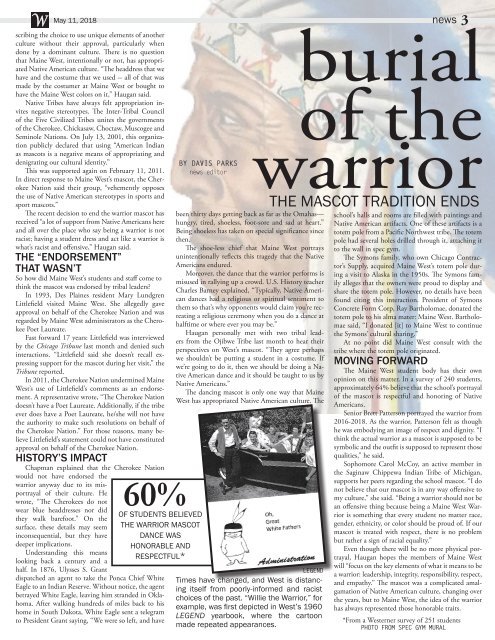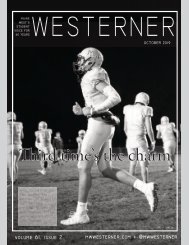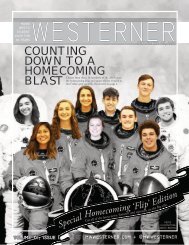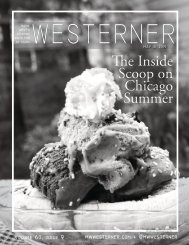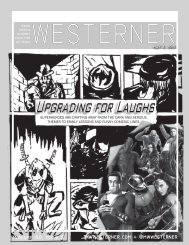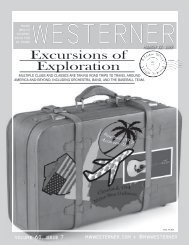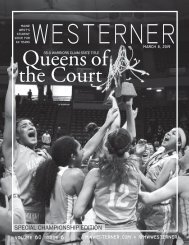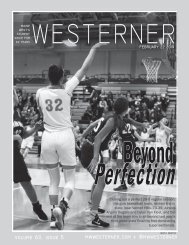You also want an ePaper? Increase the reach of your titles
YUMPU automatically turns print PDFs into web optimized ePapers that Google loves.
W <strong>May</strong> 11, <strong>2018</strong> news 3<br />
burial<br />
of the<br />
warrior<br />
BY DAVIS PARKS<br />
news editor<br />
scribing the choice to use unique elements of another<br />
culture without their approval, particularly when<br />
done by a dominant culture. There is no question<br />
that Maine West, intentionally or not, has appropriated<br />
Native American culture. “The headdress that we<br />
have and the costume that we used -- all of that was<br />
made by the costumer at Maine West or bought to<br />
have the Maine West colors on it,” Haugan said.<br />
Native Tribes have always felt appropriation invites<br />
negative stereotypes. The Inter-Tribal Council<br />
of the Five Civilized Tribes unites the governments<br />
of the Cherokee, Chickasaw, Choctaw, Muscogee and<br />
Seminole Nations. On July 13, 2001, this organization<br />
publicly declared that using “American Indian<br />
as mascots is a negative means of appropriating and<br />
denigrating our cultural identity.”<br />
This was supported again on February 11, 2011.<br />
In direct response to Maine West’s mascot, the Cherokee<br />
Nation said their group, “vehemently opposes<br />
the use of Native American stereotypes in sports and<br />
sport mascots.”<br />
The recent decision to end the warrior mascot has<br />
received “a lot of support from Native Americans here<br />
and all over the place who say being a warrior is not<br />
racist; having a student dress and act like a warrior is<br />
what’s racist and offensive,” Haugan said.<br />
THE “ENDORSEMENT”<br />
THAT WASN’T<br />
So how did Maine West’s students and staff come to<br />
think the mascot was endorsed by tribal leaders?<br />
In 1993, Des Plaines resident Mary Lundgren<br />
Littlefield visited Maine West. She allegedly gave<br />
approval on behalf of the Cherokee Nation and was<br />
regarded by Maine West administrators as the Cherokee<br />
Poet Laureate.<br />
Fast forward 17 years: Littlefield was interviewed<br />
by the Chicago Tribune last month and denied such<br />
interactions. “Littlefield said she doesn’t recall expressing<br />
support for the mascot during her visit,” the<br />
Tribune reported.<br />
In 2011, the Cherokee Nation undermined Maine<br />
West’s use of Littlefield’s comments as an endorsement.<br />
A representative wrote, “The Cherokee Nation<br />
doesn’t have a Poet Laureate. Additionally, if the tribe<br />
ever does have a Poet Laureate, he/she will not have<br />
the authority to make such resolutions on behalf of<br />
the Cherokee Nation.” For those reasons, many believe<br />
Littlefield’s statement could not have constituted<br />
approval on behalf of the Cherokee Nation.<br />
HISTORY’S IMPACT<br />
Chapman explained that the Cherokee Nation<br />
would not have endorsed the<br />
warrior anyway due to its misportrayal<br />
of their culture. He<br />
60%<br />
OF STUDENTS BELIEVED<br />
THE WARRIOR MASCOT<br />
DANCE WAS<br />
HONORABLE AND<br />
RESPECTFUL*<br />
wrote, “The Cherokees do not<br />
wear blue headdresses nor did<br />
they walk barefoot.” On the<br />
surface, these details may seem<br />
inconsequential, but they have<br />
deeper implications.<br />
Understanding this means<br />
looking back a century and a<br />
half. In 1876, Ulysses S. Grant<br />
dispatched an agent to take the Ponca Chief White<br />
Eagle to an Indian Reserve. Without notice, the agent<br />
betrayed White Eagle, leaving him stranded in Oklahoma.<br />
After walking hundreds of miles back to his<br />
home in South Dakota, White Eagle sent a telegram<br />
to President Grant saying, “We were so left, and have<br />
been thirty days getting back as far as the Omahas—<br />
hungry, tired, shoeless, foot-sore and sad at heart.”<br />
Being shoeless has taken on special significance since<br />
then.<br />
The shoe-less chief that Maine West portrays<br />
unintentionally reflects this tragedy that the Native<br />
Americans endured.<br />
Moreover, the dance that the warrior performs is<br />
misused in rallying up a crowd. U.S. History teacher<br />
Charles Barney explained, “Typically, Native American<br />
dances had a religious or spiritual sentiment to<br />
them so that’s why opponents would claim you’re recreating<br />
a religious ceremony when you do a dance at<br />
halftime or where ever you may be.”<br />
Haugan personally met with two tribal leaders<br />
from the Ojibwe Tribe last month to hear their<br />
perspectives on West’s mascot. “They agree perhaps<br />
we shouldn’t be putting a student in a costume. If<br />
we’re going to do it, then we should be doing a Native<br />
American dance and it should be taught to us by<br />
Native Americans.”<br />
The dancing mascot is only one way that Maine<br />
West has appropriated Native American culture. The<br />
LEGEND<br />
Times have changed, and West is distancing<br />
itself from poorly-informed and racist<br />
choices of the past. “Willie the Warrior,” for<br />
example, was first depicted in West’s 1960<br />
LEGEND yearbook, where the cartoon<br />
made repeated appearances.<br />
THE MASCOT TRADITION ENDS<br />
school’s halls and rooms are filled with paintings and<br />
Native American artifacts. One of these artifacts is a<br />
totem pole from a Pacific Northwest tribe. The totem<br />
pole had several holes drilled through it, attaching it<br />
to the wall in spec gym.<br />
The Symons family, who own Chicago Contractor’s<br />
Supply, acquired Maine West’s totem pole during<br />
a visit to Alaska in the 1950s. The Symons family<br />
alleges that the owners were proud to display and<br />
share the totem pole. However, no details have been<br />
found citing this interaction. President of Symons<br />
Concrete Form Corp, Ray Bartholomae, donated the<br />
totem pole to his alma mater: Maine West. Bartholomae<br />
said, “I donated [it] to Maine West to continue<br />
the Symons’ cultural sharing.”<br />
At no point did Maine West consult with the<br />
tribe where the totem pole originated.<br />
MOVING FORWARD<br />
The Maine West student body has their own<br />
opinion on this matter. In a survey of 240 students,<br />
approximately 64% believe that the school’s portrayal<br />
of the mascot is respectful and honoring of Native<br />
Americans.<br />
Senior Brett Patterson portrayed the warrior from<br />
2016-<strong>2018</strong>. As the warrior, Patterson felt as though<br />
he was embodying an image of respect and dignity. “I<br />
think the actual warrior as a mascot is supposed to be<br />
symbolic and the outfit is supposed to represent those<br />
qualities,” he said.<br />
Sophomore Carol McCoy, an active member in<br />
the Saginaw Chippewa Indian Tribe of Michigan,<br />
supports her peers regarding the school mascot. “I do<br />
not believe that our mascot is in any way offensive to<br />
my culture,” she said. “Being a warrior should not be<br />
an offensive thing because being a Maine West Warrior<br />
is something that every student no matter race,<br />
gender, ethnicity, or color should be proud of. If our<br />
mascot is treated with respect, there is no problem<br />
but rather a sign of racial equality.”<br />
Even though there will be no more physical portrayal,<br />
Haugan hopes the members of Maine West<br />
will “focus on the key elements of what it means to be<br />
a warrior: leadership, integrity, responsibility, respect,<br />
and empathy.” The mascot was a complicated amalgamation<br />
of Native American culture, changing over<br />
the years, but to Maine West, the idea of the warrior<br />
has always represented those honorable traits.<br />
*From a Westerner survey of 251 students<br />
PHOTO FROM SPEC GYM MURAL


